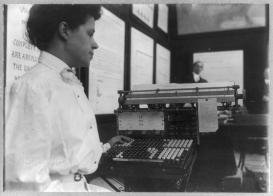The advent of punch cards and the electric tabulating machine invented in 1889 is typically described as a key milestone in the development of modern data processing, bringing about a fundamental and inexorable transformation of information technology. This project challenges this machine-centered assumption by addressing an apparent paradox that has long defied explanation: why Prussia, the military and economic powerhouse that constituted nearly three-fifths of the German Empire, opposed punch card mechanization for more than two decades. By focusing on manual census compilation in nineteenth-century Prussia, the project reveals an unremarked European revolution in data processing during the 1860s, when a new notion of "data," novel paper tools, and a carefully nurtured workforce, including many women working from home, yielded unprecedented and refined census statistics. The project unveils the concepts and workings of Prussia's machinery of data power as deeply embedded in their social and political ramifications. A "thick description" of manual census abstraction practices and the frictions evolving from them renders the Prussians' choice a well-thought-out strategy. Prussia's reluctance toward punch card machinery decenters the American Hollerith revolution. The project claims that both manual and mechanical data processing rested on the same principle: a movable paper tool carrying all relevant data of one single person, which enabled statisticians to sort and compile census data in new ways. Mid-nineteenth-century manual concepts, technologies, and practices of data power—rather than punch cards and Hollerith's machines—heralded the modern information age.

